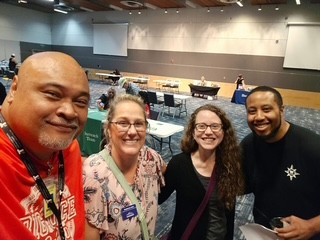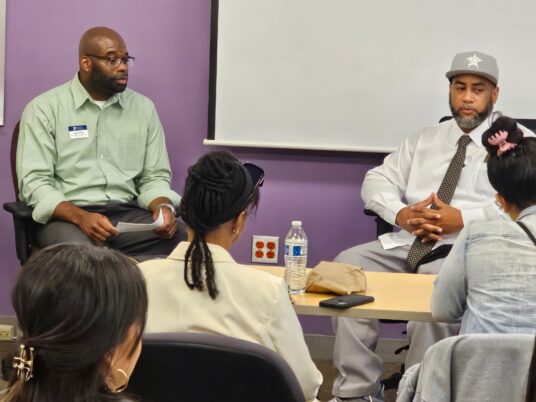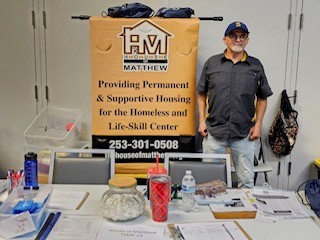Breaking barriers: Supporting justice-impacted students at CPTC
By Jean Borst
Higher education has the power to transform lives. But for individuals impacted by the criminal justice system, that path comes with barriers that seem impossible to overcome.
At Clover Park Technical College (CPTC), Corrections Education Navigator Stephenie Jekel knows that struggle — and is using her own journey to help others succeed.
Helping people belong
“I never set out to do this work, and when the opportunity came up four years ago, I almost didn’t apply,” Jekel said. “I thought, I have a felony – they won’t hire me. But I was assured that wouldn’t be an issue. So, I applied, got the job and loved it.”
Convicted of a single felony for theft more than 15 years ago, Jekel remembers how intimidating and isolating it felt to start college after her release.
“I didn’t tell anyone about my conviction when I first enrolled at Tacoma Community College,” she said. “I was so afraid they’d say I couldn’t be there. That stigma keeps a lot of people from even trying. Now, I get to be the person who says, ‘Yes, you do belong here.’”
Jekel began her career inside Washington’s correctional facilities, bringing college education into some of the most challenging environments, including the state penitentiary’s closed custody unit, which houses some of the most dangerous individuals in the state.
“People there had been told education wasn’t for them,” she said. “But when we brought in an associate degree program, every classroom seat filled.”
Students also started talking about goals and building vision boards. Even the atmosphere of the unit changed.
“The number of incidents was significantly reduced, which at the time felt almost unheard of,” Jekel said.
Building pathways to reentry
Washington’s Corrections Education Program is the only initiative of its kind in the nation. It places college-based navigators inside correctional facilities to help justice-impacted individuals prepare for education, career and community reentry.
Based at CPTC, Jekel helps students begin their transition a year before release. Her work includes career and education planning, connecting individuals with community services, and easing the transition through “warm handoffs” – coordinated introductions between Corrections Education Navigators inside facilities and Community Navigators in the counties where students will return.
“We look at all the pieces together and help students think through what they want to do, where they’ll live and how they’ll support themselves,” Jekel said. “I want students to leave believing they can succeed.”
That support doesn’t end at the prison gates. Jekel walks alongside students throughout their education journey, helping them access opportunities that reduce recidivism and open doors to employment.
She currently works with nearly 100 students preparing for reentry or already back in the community. She credits CPTC staff and faculty for helping her grow her position quickly and make an impact.
“I couldn’t do this without the support of everyone at CPTC,” she said. “Everywhere I’ve gone on this campus, I’ve been met with open arms. The people here are excited to make lives better for our students.”
For justice-impacted students, housing is often the biggest challenge after release. Even when affordable options exist, many landlords won’t rent to someone with a record. Jekel makes sure her students know their rights, including an important fact: in Washington, if it’s been more than seven years since a conviction, applicants are no longer required to check the felony box on housing forms.
From prison to purpose
The impact of this work is best seen through students themselves.
While incarcerated at Airway Heights Correction Center (AHCC) in eastern Washington, Terry Rudolph connected with a navigator who showed him that college could be a pathway to freedom. Her guidance led him to CPTC, and for the first time, he began to see that a new life was possible.
“Reentry doesn’t happen by accident; it takes preparation,” Rudolph said. “At AHCC, I started laying the foundation. I took classes, listened to advice, and learned how to shift my mindset from limitation to opportunity.”
Rudolph walked onto the CPTC campus for the first time in March 2025. Today, he’s an A student in the Human Services program and was recently offered the position of Student Engagement Ambassador with Student Life.
“The day I first connected to CPTC, I didn’t know what the future would hold,” he said. “But I believed – maybe for the first time – that I had real tools to create change.”
Rudolph’s success isn’t just measured by grades or titles. He’s rebuilt healthy relationships with his family, found purpose in helping others, and set his sights on a future as a pastor or chaplain, returning to prisons not as an inmate but as a messenger of hope.
“If my journey has taught me anything, it’s this: no matter how far you’ve fallen, redemption and purpose are always within reach,” he said.
Creating community connections
Stories like Rudolph’s show that education and mentorship can change lives. But reentry is about more than school. That’s why Jekel launched CPTC’s first-ever Reentry Resource Clinic in September – a groundbreaking event that connected individuals and families with a full spectrum of support.

The clinic drew more than 150 participants – including 40 juvenile offenders – and over 30 vendors from Pierce, King, Thurston and Lewis Counties. Justice-impacted students arrived with lists of barriers, and partners provided resources for education, housing, employment, health care, mental health and substance abuse counseling, legal aid and more. By the end of the day, everyone left with solutions to their barriers and a plan of action.


The event also featured a workshop where students heard firsthand stories of perseverance and successful reentry. Navigators from across the state joined in, making it a true regional collaboration. Thanks to the Buddhist Tzu Chi Foundation, enough meals were provided for 300 people.
“This clinic was about more than resources,” Jekel said. “It was about creating a sense of unity. We’re all residents here – felony or not. If people come back to the community without support, that’s when crime happens. But if we give them education, housing, jobs, and a chance to start fresh, everyone benefits.”
The next reentry clinic is slated for spring 2026.
Important work that matters
For Jekel, the mission is clear: create a sense of community where justice-impacted individuals know they have a place. Her own journey proves it’s possible.
“Fifteen years ago, I had a theft conviction. Today, I recently completed by second master’s degree and I’m working on my PhD,” she said. “I tell my students: don’t let your past define you. Write down your goals and believe them. If you can see yourself there, we can help you get there.”